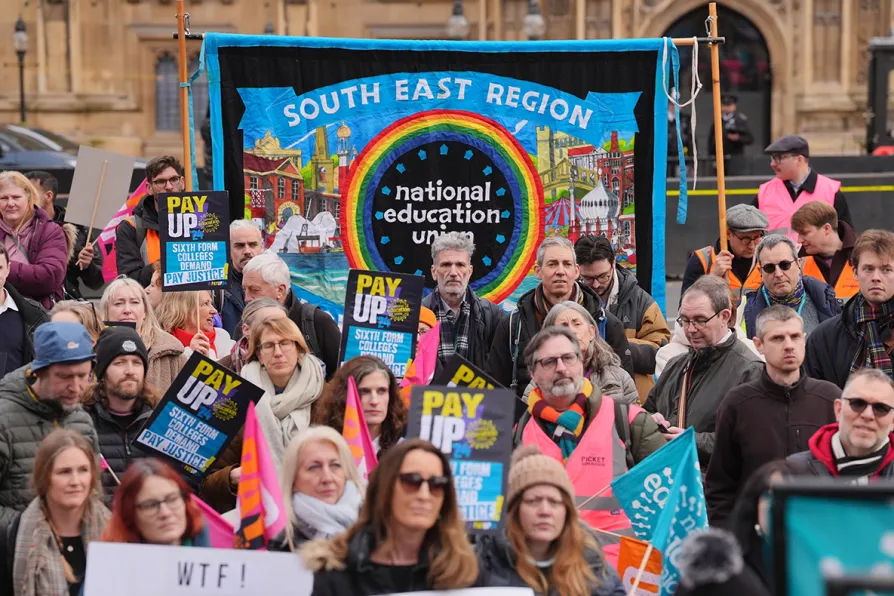
 Members of the National Education Union (NEU) hold a rally at Old Palace Yard, in Westminster, London, January 29, 2025
Members of the National Education Union (NEU) hold a rally at Old Palace Yard, in Westminster, London, January 29, 2025
UNIONS threatened teacher, NHS and council strikes today after No 10 insisted that it would not fund public-sector pay rises.
The Treasury said that pay rises for NHS staff and teachers must be paid from existing budgets, following reports that pay review bodies have backed awards higher than the 2.8 per cent budgeted for by the government.
The sectors’ bodies have recommended rises of about 4 per cent for teachers and 3 per cent for NHS staff to ministers, according to the Times.
The Royal College of Nursing (RCN) responded, saying that any award must be fully funded. The National Education Union (NEU) and NASUWT teaching unions threatened strike action if schools do not get extra funding to pay for the salary increase for teachers.
Unite warned today of potential industrial action this summer after council leaders offered a 3.2 per cent pay increase for local authority workers in England, Wales and Northern Ireland.
Unison said its National Joint Council will meet next week to discuss the local government employers’ pay offer before “deciding next steps.”
Warning that “teachers are sick of hearing things through the press,” NEU general secretary Daniel Kebede said that a 4 per cent “is something we would ask our members to consider,” and that government can avoid strike action “by publishing the report promptly and ensuring that pay awards are funded properly.”
“If they’re not fully funded, then schools will have to make cuts which no parent, no teacher, wants to see,” he said.
RCN’s Jo Galbraith-Marten said that the 3 per cent rise “will do little to turn things around.”
“We need direct negotiations with the government, not a pay review body process from a bygone era,” she said.
“Any pay award must be fully funded, taking resources away from frontline services is unfair on staff and bad for patients.
“We have a live survey of members open on what they think about the government’s 2.8 per cent proposal and what action, including industrial action, they might be prepared to take.”
Unison head of health Helga Pile added: “With so much at stake, ministers need to show they value the workforce.
“Prime Minister Sir Keir Starmer said that no decisions had been made on the recommendations, as “we are not at that stage of the process.”
But his official spokesman said that the government would not be providing any extra funding for increases above 2.8 per cent.
Meanwhile, Unite announced that it will hold consultative ballots for its thousands of local authority members, recommending they reject the 3.2 per cent offer.
Unite general secretary Sharon Graham said: “Yet again, this year’s pay offer fails to tackle low pay for local government workers, who have endured years of below-inflation rises on top of the cost-of-living crisis.”
Unite national officer for local authorities Clare Keogh described the offer as “very disappointing” for members, adding that national employers have “disgracefully failed to negotiate” with Unite on it for the fourth year in the row.
Unison’s head of local government Mike Short said: “With household bills still rising, council and school staff need a decent pay award after years of below-inflation deals and deep cuts to local government services.”
The government backed 2.8 per cent rises for public-sector workers last December.
The RCN at the time called the proposed rise a “deeply offensive” figure. Unison described it as “barely above the cost of living.”
Unite warned that the NHS recruitment and retention crisis “will not be solved without taking the issue of restorative pay seriously.”
And the British Medical Association warned: “When doctors accepted their pay offers this summer, the government was under no illusion about the need to continue to reverse the effects of pay erosion, the path set to achieve that in future pay rounds, and the very real risk of further industrial action if this was not achieved.”
The government last year ended long-running public sector strikes by accepting pay bodies’ recommendations of 4.75 per cent and 6 per cent.

Unions slam use of review bodies and long-term decline in value of wages












